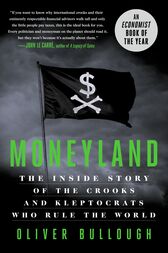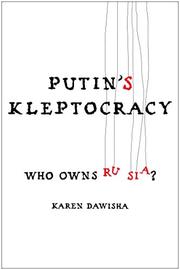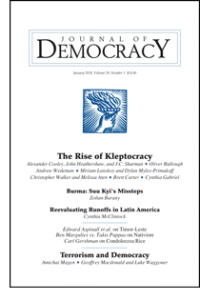 At the recent Summit for Democracy, non-governmental actors– among them leading activists and dissidents – implored participating governments to stand up to kleptocracy, according to the official account.
At the recent Summit for Democracy, non-governmental actors– among them leading activists and dissidents – implored participating governments to stand up to kleptocracy, according to the official account.
In the United States, the bipartisan congressional coalition committed to fighting kleptocracy and corruption has already had one major success, the passage of the bipartisan Corporate Transparency Act (CTA). And the Financial Crimes Enforcement Network (FinCEN)’s impressive CTA rulemaking shows how a committed executive branch can turn strong legislation into a strong regulatory regime, note analysts Gabe Lezra and Jenna Grande with Citizens for Responsibility and Ethics in Washington (CREW). The collaboration that resulted in the CTA proves that Congress can design a truly state of the art anti-money laundering regime, and it should use that ability to marshal the power of civil society by amending the CTA to make the new beneficial ownership registry available to the public, they write for Just Security.
The U.S. Treasury will establish a pilot Kleptocracy Assets Recovery Rewards program to provide payments to individuals for information leading to the identification and recovery of stolen assets linked to foreign government corruption held at U.S. financial institutions, says the new U.S. Strategy on Countering Corruption. In addition, USAID’s Anti-Corruption Response Fund aims to “respond to the increasingly globalized nature of corruption and its linkages to transnational organized crime, kleptocracy, and strategic corruption.”
 There was a time when people hoped kleptocracy would be a passing problem for Russia, something it would grow out of on its way to becoming a democracy. That has sadly not turned out to be the case, notes Oliver Bullough, author of Moneyland: Why Thieves And Crooks Now Rule The World And How To Take It Back.
There was a time when people hoped kleptocracy would be a passing problem for Russia, something it would grow out of on its way to becoming a democracy. That has sadly not turned out to be the case, notes Oliver Bullough, author of Moneyland: Why Thieves And Crooks Now Rule The World And How To Take It Back.
Citing this piece of research by the Institute for Public Administration and Governance (IPAG) of the Higher School of Economics National Research University in Moscow whose researchers canvassed 1,200 Russian businesspeople working with state organs and asked how much of the total volume of the contract they would expect to pay as a bribe, he writes for Coda Story:
Taken together, more than 70% of respondents said they expected to encounter corruption when dealing with officials (I reckon that’s on the low side and at least some of the other 30% were lying), and they paid an average of 22.5% of the contract’s value to the official who signed off on it. That meant the total added to state contracts last year to settle the corrupt demands of officials was 6.6 trillion rubles (about $89 billion). That is more than a third of Russia’s state budget, or approximately 6% of the country’s GDP.
“In current conditions, it is more profitable for a supplier to collude than to work on the uniqueness or innovation of their goods, products or services,” the academics conclude. RTWT
 Defending Russia’s kleptocracy is the motivation behind the Kremlin’s current belligerence, says The Washington Post.
Defending Russia’s kleptocracy is the motivation behind the Kremlin’s current belligerence, says The Washington Post.
Mr. Putin has no legitimate casus belli regarding Ukraine. What he seems really to fear is not Ukraine-based NATO missiles, as he claims, but the growth and development of a successful, Western-oriented democracy in Kyiv, the exemplary existence of which would destabilize his own kleptocratic regime, it contends.
Daria Kaleniuk, and Olena Halushka of Ukraine’s Anti-Corruption Action Center agree. Ukraine’s democratization and efforts to fight entrenched graft and cronyism are a direct threat to Putin’s model of governance, they write for Foreign Policy.
The country’s democratization and ongoing efforts to fight entrenched graft and cronyism are a threat to Putin’s model of governance. https://t.co/7F4xbA7FQW
— Democracy Digest (@demdigest) December 23, 2021
 Empowering civil society and investigative journalists to hold politicians and officials to account, supporting and promoting their work, and ensuring the international community responds to the criminality they identify will be a key contributor to ensuring democracies remain responsive and resilient, adds RUSI. Kleptocracy undermines democracy. Bolstering the capacity of journalists and civil society to respond must be a priority.
Empowering civil society and investigative journalists to hold politicians and officials to account, supporting and promoting their work, and ensuring the international community responds to the criminality they identify will be a key contributor to ensuring democracies remain responsive and resilient, adds RUSI. Kleptocracy undermines democracy. Bolstering the capacity of journalists and civil society to respond must be a priority.
RUSI’s Centre for Financial Crime and Security Studies hosts a webinar with investigative journalists and members of civil society from East Africa to consider the measures needed to strengthen local responses to corruption and kleptocracy.
Securing Democracy from Illicit Finance: Strengthening the First Mile
Monday, 07 February 202211:00 – 12:00 (GMT)
Speakers
- John Githongo, Investigative journalist
- Sheila Masinde, Director at Transparency International Kenya
- John-Allan Namu, Investigative journalist, Africa Uncensored
The panel discussion will be chaired by Maria Sofia Reiser of RUSI’s CFCS. RSVP
This event is part of the Restricting Kleptocracy project of the Centre for Financial Crime and Security Studies at RUSI funded by the National Endowment for Democracy (NED). The project engages with journalists and civil society actors focused on financial crime in East Africa and Latin America to empower them to hold government institutions and regulated businesses to account on their roles and responsibilities in tackling domestic financial crime. Visit the project web page here.







